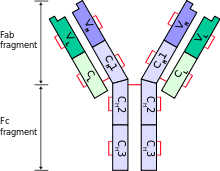Allotype (immunology)

The allotype affects the constant region (labeled CL and CH1-3 in the diagram.)
In immunology, an immunoglobulin allotype is the allele of the antibody chains found in the individual. The word allotype comes from two Greek roots, allo meaning 'other or differing from the norm' and typos meaning 'mark.' Thus allotype refers to the idea that each immunoglobin has unique sequences particular to the individual's genome that manifest in its constant region (normally).
The most important types are Gm (heavy chain) and km (light chain).
It can be used in resolving paternity disputes.[1]
See also
References
- ↑ "THE STRUCTURE AND FUNCTION OF IMMUNOGLOBULINS - ANTIBODIES". Retrieved 2009-05-19.
External links
- Immunoglobulin allotypes at the US National Library of Medicine Medical Subject Headings (MeSH)
- Overview at University of South Carolina School of Medicine
- Overview at Southern Illinois University Carbondale
This article is issued from
Wikipedia.
The text is licensed under Creative Commons - Attribution - Sharealike.
Additional terms may apply for the media files.